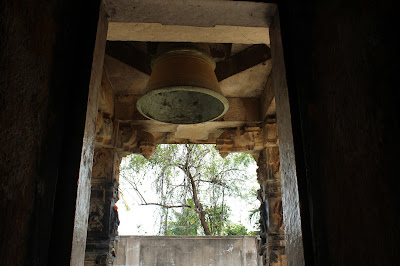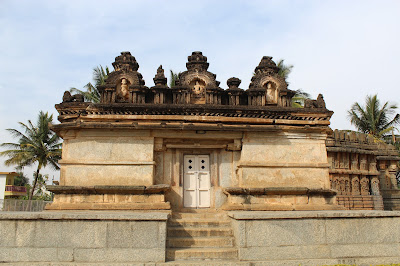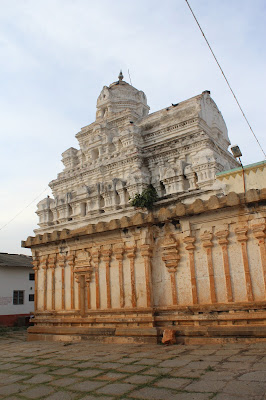PREFACE
Log entries .
One nippy Saturday morning the Gallivanters attempted to seek,
savour and soak in
the architecture, sculpture and the religious spirit of the
temples lying within the radius of 100 kilometres of Bangalore.
Ambitious or foolhardy ?
Attempting to locate temples dotting the countyside and towns of
distict Tumkur was a no mean feat...a feat that at times became almost Quixotic.
We had to contend with absence of signboards , regional variations of official names and locked premises .
In remote areas for temples like these , more often than not , the caretaker is a mobile number scribbled on the
gate!
But the real challenge lay in identifying the dynasties that built
these temple where the telltale signature styles are frequently intermingled due to renovations down the ages.
In, 'To boldly go where no man has gone before...' mode we
started in our enterprise at 6:oo in the morning. We were ably helped by Google Maps, Wikipedia and a sarthi
called Swami who had already helped us in planning the itinerary and on the day of travel , guided us over phone and came to our rescue when we were completely lost.
The endearing part of the trip lay in the fact that it opened our
eyes to the richness of the heritage in our very own backyard! Each stop was like the unfolding of a saga or the unravelling of a Christmas present. Each confronted us with more questions then we knew the answers to.
In these questions lies a quest ; a quest to find answers, a promise of conversation
with like minded friends and a hint of another trip to these places some time
later, to verify the answers.... thus it became a trip that never ended but a
journey that beagan on that Ekadashi day
A quick review of the day as it unfolded -
1. A temple by the lake - Kunigal
The Hale Somesvara temple has a beautiful temple complex and is located around a huge lake. The serene setting, the quiet of the place was very inviting almost making us desirous of a picnic hamper.
The very remote location made us wonder about it historical significance.
Who built this temple complex and when ?
2. Turuvekere - A Heritage town without the tag
Turvekere in Europe would have long been declared a heritage town,
maintained, preserved , feted and looked after well. But that is not going to be blessed so.
It is a town dotted with temples criss crossing the streets, the
streets on which stand traditional houses. The whole place had
a charm of its own to which words will do no justice!
This town seemed to be a part of Hoyasala kingdom.
What was the
significance of this little town, economically, politically and culturally ?
2 A . Gangadhareshwara temple...Big bull. big bell and big heartedness
2 A . Gangadhareshwara temple...Big bull. big bell and big heartedness
The the big beautiful Nandi at the temple of
Gnagadhareshwara was a sheer delight.The Nandi is comparable to any of the celebrated Nandi's
found in the country. Was it a Hoyasala styled Nandi? The exquisitensess
definitely pointed towards that.
But another thing to further add to oursense of wonder was the the bell,
apparently carved out of soap stone !!
A very definite vijayanagara style add-on . A lovely porch with single stone yali pillars .
The highlight of the temple visit was the lunch invitation
extended by the priest on behalf of the family hosting a naming ceremony in the
temple.....Big Bull, Big Bell and Big hearted devotees.....it is only
happens in small towns and lesser known temples!
Then came the turn of authentic Hoyasala temples, meaning the ASI
had done the honours of putting up a sign board and a gaurd to look after the
monument.
2 B . The Chennigaraya temple- A living Heritage
The adhisthana was full of school children sitting cross legged
waiting for their turn to recite a shloka from Bhagwad Gita. The local school
was celebrating Geeta Jayanti and it so happened that it was Ekadashi too.
Vishnu's grace would have definitely blessed these children!
This was a basic temple, with Hoysala style walls and pagoda , but with no sculptures at all on the outer walls . Perhaps one of the nascent ones .
Yet the shloka chanting school children made it the most alive Hoyasala temple!!
Yet the shloka chanting school children made it the most alive Hoyasala temple!!
Third stop was the Moolashanakra temple.
2 C Moolashankara Temple- Temple Tales of Serpent Visits
2 C Moolashankara Temple- Temple Tales of Serpent Visits
The care taker was the priest, who was taking part in the naming
ceremony at Gangadhareshwara temple....a phone call and he was there in ten
minutes to show us around. He was spinner of yarns or facts but his stories gave the temple a life, flesh and blood of its own!
He pointed out the idols of Kartikeya, Kapal Bhairava, Saptamatrikas and shared interesting story about a naga pair visiting the temple in the evening!!
He pointed out the idols of Kartikeya, Kapal Bhairava, Saptamatrikas and shared interesting story about a naga pair visiting the temple in the evening!!
Now was the turn of Nolamba territory. Much like the dynasty the
temple at Aralaguppe is not very well known. But it was the most
astounding piece of surpise.
3 A . Aralaguppe Kalleswara Temple- A hidden Jewel
3 A . Aralaguppe Kalleswara Temple- A hidden Jewel
The temple looks fairly simple with few of the Nolamba traits but
its simplicity is deceptive. For the mandapa contains a ceiling to die for!
The Natesa in the Ashtadikpala panel is unparalleled, feted by experts C. Sivramamoorthy and BL Rice.
The conception, design and the execution of the Ashtadikpala panel
is unbelievable,We had read about it, seen its pictures and knew that it was
certified by the experts. Yet we were totally unprepared for the
almost three dimensional Kubera , Ishana , Indra , Nairuti , Vayu, Varuna, Agni and Yama that greeted us. The rounded sculpting made them look like sculptures rather than
panel friezes. The detailing on the sculptures be it of the Dikpalas or their
better halves or their vahanas is something that was neither attempted before
nor was it attempted later even when a blue print existed on the ceiling at
Aralaguppe!
The personal best for all three of us was the Uma Maheshwara idol. More on it in a special post!
Next stop was the Chennakesava temple.
3 B Chennakesava Temple- A temple duly autographed
3 B Chennakesava Temple- A temple duly autographed
It seemed like a near perfect example of the Hoysala style.
But what was this stucco Vimana doing , sprouting out of a Hoysala temple?
No blending of styles but plain fusing of two different schools.
Why and by whom needs to be looked into.
Why and by whom needs to be looked into.
4 A Nonavinakere Bettaraya Swami Temple
The last stop at Nonavinakere was a bit of an adventure.
The dipping energy levels and the dying battery of the phone compounded our troubles. But our Sarthi and Nolambareshwara's grace saw us through. We hit the town road and stopped at a small tea shop. The locals guided us to the twin temples of Nolambareshwara and Gangareshwara.
But before that , Bettaraya Swami waylaid us and we were at his doorsteps. Why? Because he was guiding us in our mission. The mission to trace Nolamba architectural and sculptural legacy. At this temple we spotted a vimana somewhat similar to the one at Panchalingeshwara temple at Begur.
Conjecture or a hypothesis? .... it needs to be studied further but it seemed like a sign that we were in Nolamba territory. After all Nonavinakere used to be Nonambavinakere, which is a derivation of the name Nolamba aka Nonamba.
4 B Twin temples of Nolamabareshwara and Gangeshwara
This modest looking temple is deceptive, hiding within it the power of Shiva. The politicians of all hues from all parties come to these two to seek the blessings, much like the Nolamba rulers of yore who must have consecrated the divine power by erecting the twin temples!
The Nolamba dynasty and their temples enjoy little or no recognition.No one sings paens in praise of Nolamba sculptures or the unique architectural features. We have already seen the ashtadikpalas at Aralaguppe. The Uma Maheshwara idol in the sanctum will make us think differently. Their conribution is no less. It is only our myopic vision and the conditioning that beauty lies only in Chalukya, Chola, Pallava or Hoyasala sculptures, that arrests our appreciation. May this Uma Maheshwara shatter that conditioning and correct our vision!
Enjoy this trip of thousand years aross a day in few seconds!!
Thousand years in a few seconds
Enjoy this trip of thousand years aross a day in few seconds!!
Thousand years in a few seconds






















No comments:
Post a Comment